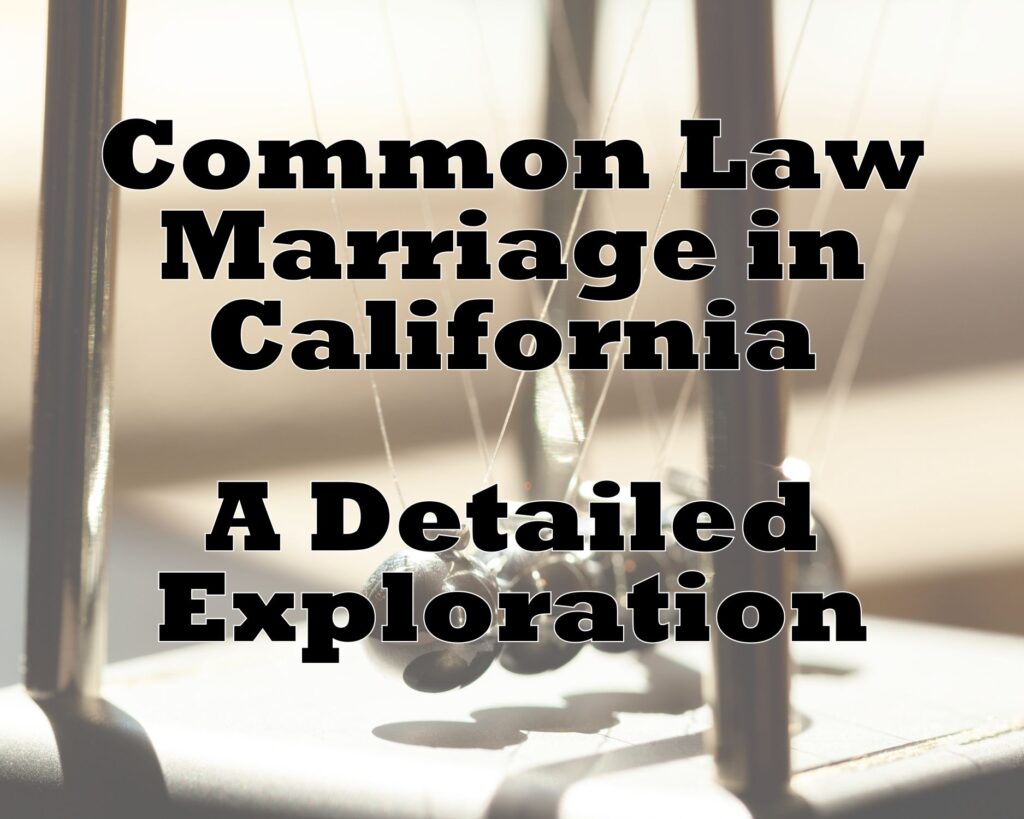In California, the concept of common law marriage often leads to confusion and misconceptions. This article aims to clarify the legal standing and implications of common law marriage in the state, providing valuable insights for couples living together in California.
Understanding Common Law Marriage
Common law marriage refers to a union where a couple lives together and presents themselves as married without a formal ceremony or marriage license. While some states recognize such arrangements as legally binding marriages, California’s stance differs.
California’s Stance on Common Law Marriage
It’s crucial to understand that California does not recognize common-law marriages created within the state. This means that no matter the duration of cohabitation or how a couple represents their relationship, they are not considered legally married under California law. This non-recognition has significant implications for property rights, inheritance, and other legal matters.

Recognizing Out-of-State Common Law Marriages
While California does not establish common law marriages, it does recognize those legally formed in other states. If a couple enters into a common law marriage in a state where it’s legal, California will acknowledge their marital status.
Legal Implications of Non-Recognition
The non-recognition of common law marriages in California affects various aspects of a couple’s life, especially if they separate. Issues related to spousal support, property division, and inheritance rights are treated differently than for legally married couples.
Cohabitation Agreements
For cohabiting couples in California, a cohabitation agreement can be a useful legal tool. This agreement outlines the relationship’s terms, property rights, and responsibilities, offering a level of legal protection similar to a prenuptial agreement.
Understanding the legal implications of common-law marriage is crucial for couples living together in California. Cohabiting couples should consider legal agreements to protect their rights and outline their responsibilities. Consulting with a legal professional is recommended for personalized advice and guidance.
For a deeper understanding of common law principles, consider exploring “The Common Law” by Oliver Wendell Holmes Jr., a classic text that offers insights into the origins and development of common law. This book is an indispensable read for anyone interested in the legal philosophy that continues to influence American jurisprudence.
While California’s stance on common law marriage is clear, understanding its nuances is crucial for couples who cohabit without a formal marriage. This section delves deeper into the topic, offering further insights and considerations.
Property Rights and Common Law Relationships in California
One of the most significant implications of California’s non-recognition of common-law marriage is property rights. In a legal marriage, property acquired during the marriage is typically considered community property and is subject to division upon divorce. However, in a cohabiting relationship without a formal marriage, property division follows different rules, often based on title ownership or agreements made between the partners.
Inheritance Rights and Common Law
Inheritance rights are another area where the lack of common-law marriage recognition in California plays a crucial role. Without a legal marriage, a partner may not have the right to inherit from the other unless specified in a will or other legal document. This makes estate planning particularly important for cohabiting couples.
The Role of Cohabitation Agreements
Given the legal complexities surrounding cohabitation in California, entering into a cohabitation agreement can be a wise move. Such agreements can specify how property and finances will be handled during the relationship and in the event of a breakup, providing clarity and protection for both parties.
Children and Parental Rights
For couples with children, California law provides clear guidelines on parental rights and responsibilities, regardless of the parents’ marital status. Issues related to child custody, visitation, and support are determined based on the child’s best interests and are not directly affected by the parents’ marital status.
Seeking Legal Advice
Given the complexities of the law in this area, seeking legal advice is crucial. A family law attorney can provide guidance tailored to an individual’s specific situation, ensuring that their rights and interests are protected.
Questions and Answers on Common Law Marriage in California
Navigating the legalities of relationships in California can be complex, especially when it comes to understanding common law marriage. Here are some common questions and their answers to provide clarity on this topic.
1. Can a couple be considered legally married in California if they live together for a certain number of years?
- No, California does not recognize common law marriage, regardless of how long a couple has lived together. Couples are not considered legally married without a formal marriage license and ceremony.
2. If a couple has a common law marriage from another state, will California recognize it?
- Yes, if a couple legally enters into a common law marriage in a state that recognizes it, California will acknowledge their marital status. This recognition is important for legal matters such as inheritance and spousal rights.
3. How can cohabiting couples in California protect their rights?
- Cohabiting couples can create a cohabitation agreement, which is similar to a prenuptial agreement. This document can outline how property, finances, and other matters will be handled during the relationship and in the event of a breakup.
4. What happens to property acquired during a cohabiting relationship in California?
- In the absence of a legal marriage, property division for cohabiting couples typically follows the title ownership or any agreements made between the partners. Unlike in a legal marriage, there is no automatic assumption of community property.
5. Are children born to cohabiting couples treated differently under California law?
- Parental rights and responsibilities in California are determined based on the child’s best interests, regardless of the parents’ marital status. This includes custody, visitation, and child support.
6. Is estate planning important for cohabiting couples in California?
- Yes, estate planning is crucial for cohabiting couples. Since there are no automatic inheritance rights as in a legal marriage, it’s important to have a will or other legal documents to ensure that assets are distributed according to the couple’s wishes.
7. Can a cohabiting partner receive spousal support in California?
- In California, cohabiting partners are not entitled to spousal support as they would be in a legal marriage. However, they can make agreements regarding support in a cohabitation agreement.
Understanding these aspects of common law marriage in California is essential for couples living together in the state. It’s advisable to seek legal counsel to navigate these complex issues effectively. For a broader understanding of common law principles, consider reading “The Common Law” by Oliver Wendell Holmes Jr., which provides valuable insights into the historical and legal context of common law.
Legal Know It All offers a range of articles that can provide additional insights into legal topics, including those related to family law and cohabitation in California. Here are some articles from their website that you might find helpful and relevant to the topic of common law marriage:
- Understanding Power of Attorney: A Simple Guide to Making the Right Choice: This article offers valuable information on Power of Attorney, which can be an important legal tool for couples in a long-term cohabitation relationship, especially in states like California where common law marriage is not recognized.
- Navigating the Probate Process: A Comprehensive Guide to Understanding and Managing Estate Settlement: This guide is particularly useful for understanding how estate matters are handled in the absence of a recognized common law marriage, providing insights into probate and estate planning for cohabiting couples.
- Understanding Your Rights as a Tenant: A Detailed Guide: While focused on tenancy, this article can be helpful in understanding legal rights and agreements, which are also crucial in cohabitation situations where common law marriage is not applicable.
As an Amazon Associate we earn from qualifying purchases through some links in our articles.




